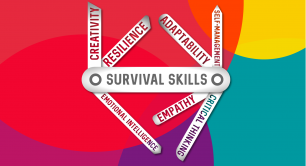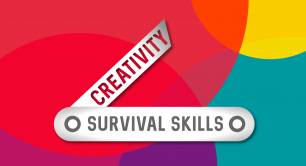Social Entrepreneurs’ Survival Skill no. 6: Empathy
Empathy helps us to resolve conflicts, create more productive teams, and improve our relationships with co-workers, clients and customers. It's also an essential survival skill for social entrepreneurs: find out how to develop your empathetic side as a leader.
It may surprise you to learn that the infamous 16th-century philosopher Niccolo Machiavelli was a master of cognitive empathy.
And he certainly advocated developing the ability to understand how people were feeling. But then only to ruthlessly manipulate and exploit the emotionally vulnerable.
It doesn’t have to be like that, of course. Used positively, empathy can be a powerful tool to tackle everyday problems. According to the leading British psychologist Professor Simon Baron-Cohen: “Empathy is like a universal solvent. Any problem immersed in empathy becomes soluble.”
Understanding other people's emotions, then, is a key skill in the workplace. It can enable us to resolve conflicts, create more productive teams, and improve our relationships with co-workers, clients and customers.
- Interview: ‘Empathy helps us nurture compassion, which helps us to take action’ - Ru Yi Teh
- Resource: Five steps for empathetic listening
- Download: Empathy Walk exercise
What is empathy?
In its simplest form, empathy is the ability to recognise emotions in others, and to understand other people's perspectives in a situation.
At its most developed, empathy delivers insights to improve someone else's mood and to help them through difficult situations.
Empathy can enable us to resolve conflicts, create more productive teams, and improve relationships with co-workers, clients and customers
Empathy is often confused with sympathy but they are not the same. Sympathy is feeling concern for someone but doesn't involve shared perspective or emotions, as empathy does.
You can feel sympathy for someone in tears, for example, without knowing anything about why they are crying. Sympathy may develop into empathy, but not necessarily.
How to develop empathy
According to influential psychologist Daniel Goleman, empathy is one of the five key components of emotional intelligence – a vital leadership skill we will cover next in our Survival Skills for Social Entrepreneurs series.
Empathy develops through three stages: cognitive, emotional and compassionate.
- Cognitive empathy is being aware of the emotional state of another person. It is a mostly rational, intellectual and emotionally neutral ability. This means, as stated above, it can also be used for negative purposes.
Managers may find cognitive empathy useful in understanding how team members are feeling. And from that, what style of leadership would get the best from them on a particular day.
- Emotional empathy is engaging with and sharing those emotions. It's sometimes called “affective empathy” because it affects or changes you. For some, though, this can be overwhelming. Becoming immersed in other people's problems can sometimes damage your own emotional wellbeing. Avoid this by taking breaks, checking your boundaries, and strengthening your ability to cope.
Anyone leading a team will benefit from developing at least some emotional empathy. It helps to build trust between managers and team members, and to develop honesty and openness.
- Compassionate empathy involves taking action to support other people.
Acknowledging someone’s hurt is valuable, and affirming their reaction by showing signs of those feelings yourself even more so. But best of all is putting aside time for them and offering practical support or guidance on getting through the situation.
To use empathy effectively, give your co-worker your full attention, looking out for verbal and nonverbal clues to help you fully understand their situation.
- Explore: Five steps for empathetic listening
Set aside your own assumptions, acknowledge your colleague's feelings, allow an emotional connection, then take positive action that will improve their wellbeing.
Asking the right questions is probably the simplest and most direct way to understand another person
When in doubt, invite the person to describe their position some more, and ask how they think they might resolve the issue.
After all, asking the right questions is probably the simplest and most direct way to understand another person.
‘Empathy helps us nurture compassion, which helps us to take action’ - Ru Yi Teh
Ru Yi Teh is an aspiring social entrepreneur with a passion for mental health, youth development, sustainability and climate change. In 2021, she took part in Project VISION, a programme designed to support young people in Malaysia and Scotland to exchange and develop ideas in response to global climate challenges. Below, Ru Yi talks with Naadiah Ahmad Mazlani, education and learning coordinator at the Social Enterprise Academy, to discuss empathy and how it has influenced her journey to becoming a social entrepreneur.
 Naadiah Ahmad Mazlani: Ru Yi, can you tell me a bit about yourself? What are you passionate about and what has motivated you to want to become a social entrepreneur?
Naadiah Ahmad Mazlani: Ru Yi, can you tell me a bit about yourself? What are you passionate about and what has motivated you to want to become a social entrepreneur?
Ru Yi Teh: I am Malaysian and regard myself as a mental health advocate who is really passionate about sustainability and youth development. I am working on being a social entrepreneur. I find that mental health is a really big issue all around the world and not just for young people, but for changemakers and entrepreneurs as well. So I am now looking at how I can integrate sustainability and mental health together – the key idea I am looking at now is a nature-based solution for mental health.
Nature is free therapy for us. But we have been ignoring it for so long and we are destroying it every day, so it’s critical for me to find a solution through The Ripple Effect Community [the project Ru Yi created this year] where we can integrate mental health and nature-based solutions together.
NAM: This is a great initiative and I'm so happy that we are hearing about more and more people focusing on using nature-based solutions for mental health. So, today we’re talking about empathy. Ru Yi, what does empathy mean for you and how do you actively practice empathy?
RYT: To me empathy is a skill that we have to develop throughout our lives and something we have to practise every day. Not only to improve our empathy, but also to reflect and pause and see which stage are we at and any lessons our empathy has brought us to.
Empathy is a skill that we have to develop throughout our lives and something we have to practise every day
I think we need to free our minds, be open-minded and free of judgment – this is how I practise my empathy. We have to be ‘empathetic’ to ourselves first. I don’t think we should underestimate the power of self-love or the power of empathy, because these two things will create the wisdom for us to nurture compassion, which helps us to take action and to achieve more.
Another key word is connection – we have to connect. For me empathy is the ability to understand and then connect with other people’s perspectives, emotionally or cognitively.
Even though we can’t put ourselves 100% into other people’s shoes, I believe we have shared emotions. We feel happy, we feel sad, we feel angry, we have all these emotions and they are a universal thing, so it is how we connect – we connect through feelings and through emotions.
It is trying to connect with other people free from judgement and being open-hearted and kind-hearted, so that’s what empathy means to me, and why is it so important, because empathy can nurture kindness, and kindness is a very, very rare value, I would say it is a skill as well.
NAM: Why do you think it is especially important for aspiring social entrepreneurs to practise emotional and compassionate empathy?
RYT: In our era, because we are becoming more and more robotic, less and less thinking happens, and then less and less human and social connection, so empathy can really help us to view our kindness towards ourselves, and towards other people. This is how we can come up with ideas and see things from a very new perspective to really help solve our world’s problems.
When I was volunteering at the Perhentian Turtle Project, I was healed by nature but at the same time, I felt guilt and anxiety – I saw the reality of the drastic impact of climate change and human behaviours on the animals and the ecosystem on the island.
While eco-anxiety grew inside me, I realised that I have to act for my mental health before I act for the planet
While eco-anxiety grew inside me, I realised that I have to act for my mental health before I act for the planet. I found my community to support me. I met a group of people with love, empathy, kindness and integrity. I gained strength from them with their openness and willingness to share and to support. And now I have the headspace to do more for the people and the planet that I care about.
NAM: Thank you Ru Yi, I can totally relate to what you say about how empathy can nurture kindness. In that sense, how do you think empathy has helped you to better understand and support people through The Ripple Effect Community?
RYT: Project VISION focused a lot on storytelling; through the stories and through listening, it cultivated our senses and through the probing questions, it prompted us to reflect more.
The facilitators asked us to ask questions and to question ourselves through feedback. Those questions helped us to reflect and then to basically think more. From thinking and asking, empathy just happened!
Especially hearing from those in Malaysia was inspiring – people in our country doing so much for the environment. I got a lot of ideas and insights from them as well; I had to evaluate my vision as I asked myself questions or people asked me questions or shared their thoughts.
- Read more social enterprise stories from Malaysia
I think the programme helped us to understand ourselves more, and through that it helped me to connect with my community. I know myself more and I could share more with them, which stimulated our empathy as well!
NAM: So Ru Yi, what is next for The Ripple Effect Community?
RYT: The Ripple Effect Community is still at its infant stage – I am focusing on research and awareness currently and my ultimate goal is to develop a social enterprise business model that could help young people who are suffering mentally.
If you resonate with my story, you are never alone, and you can join me today at The Ripple Effect – a community where you can gain social support and build your resilience to act for the people and planet you care about.
Find out more about The Ripple Effect Community here. Project VISION was delivered as part of British Council’s A.R.C Challenge Malaysia during COP26.
Five steps for empathetic listening
Empathetic listening goes beyond the skill of “active listening”. It allows you to develop and enhance relationships due to a deeper understanding of what is being conveyed, both intellectually and emotionally. Here’s our five-step plan to develop the skill:
- The role of an empathetic listener is to be supportive, kind and caring.
- Listen carefully and without judgement. Interject occasionally to show that you've understood what's being said.
- Where appropriate, repeat key phrases to encourage the speaker to open up.
- Pay attention to what's not being said, too. Take note of the speaker's emotional state, their tone of voice and their body language.
- And, when you successfully win their trust and confidence, make sure that you respect it.
More tools and resources to develop empathy:
|
Coming soon: how to develop emotional intelligence. Catch up on more survival skills for social entrepreneurs.



